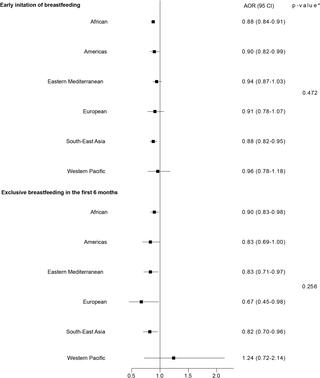Our official English website, www.x-mol.net, welcomes your
feedback! (Note: you will need to create a separate account there.)
Maternal exposure to intimate partner violence and breastfeeding practices in 51 low-income and middle-income countries: A population-based cross-sectional study.
PLOS Medicine ( IF 10.5 ) Pub Date : 2019-10-01 , DOI: 10.1371/journal.pmed.1002921 Rishi Caleyachetty 1 , Olalekan A Uthman 1 , Hana Nekatebeb Bekele 2 , Rocio Martín-Cañavate 3 , Debbie Marais 1 , Jennifer Coles 1 , Briony Steele 1 , Ricardo Uauy 4 , Peggy Koniz-Booher 5
PLOS Medicine ( IF 10.5 ) Pub Date : 2019-10-01 , DOI: 10.1371/journal.pmed.1002921 Rishi Caleyachetty 1 , Olalekan A Uthman 1 , Hana Nekatebeb Bekele 2 , Rocio Martín-Cañavate 3 , Debbie Marais 1 , Jennifer Coles 1 , Briony Steele 1 , Ricardo Uauy 4 , Peggy Koniz-Booher 5
Affiliation

|
BACKGROUND
Intimate partner violence (IPV) against women is a major global health issue, particularly in low- and middle-income countries (LMICs), that is associated with poor physical and mental health, but its association with breastfeeding practices is understudied. Both the World Health Organization (WHO) and the United Nations Children's Fund (UNICEF) recommend that children initiate breastfeeding within the first hour of birth and be exclusively breastfed for the first 6 months of life. Breastfeeding within the first hour of birth is critical to newborn survival, and exclusive breastfeeding for 6 months is recognised to offer significant health benefits to mothers and their infants. We examined the association of maternal exposure to IPV with early initiation of breastfeeding (within 1 hour of birth) and exclusive breastfeeding in the first 6 months.
METHODS AND FINDINGS
We assessed population-based cross-sectional Demographic and Health Surveys (DHS) from 51 LMICs. Data from the most recent DHS in each country (conducted between January 2000 and January 2019) with data available on IPV and breastfeeding practices were used. By WHO region, 52.9% (27/51) were from Africa, 11.8% (6/51) from the Americas, 7.8% (4/51) from the Eastern Mediterranean, 11.8% (6/51) from Europe, 11.8% (6/51) from South-East Asia, and 3.9% (2/51) from the Western Pacific. We estimated multilevel logistic regression models for any IPV and each type of IPV separately (physical violence, sexual violence, and emotional violence), accounting for demographic and socioeconomic factors. Depending on specification, the sample size varied between 95,320 and 102,318 mother-infant dyads. The mean age of mothers was 27.5 years, and the prevalence of any lifetime exposure to IPV among mothers was 33.3% (27.6% for physical violence, 8.4% for sexual violence, and 16.4% for emotional violence). Mothers exposed to any IPV were less likely to initiate breastfeeding early (adjusted odds ratio [AOR]: 0.88 [95% CI 0.85-0.97], p < 0.001) and breastfeed exclusively in the first 6 months (AOR: 0.87 [95% CI 0.82-0.92], p < 0.001). The associations were similar for each type of IPV and were overall consistent across infant's sex and WHO regions. After simultaneously adjusting for all 3 types of IPV, all 3 types of IPV were independently associated with decreased likelihood of early breastfeeding initiation, but only exposure to physical violence was independently associated with a decreased likelihood of exclusively breastfeeding in the first 6 months. The main limitations of this study included the use of cross-sectional datasets, the possibility of residual confounding of the observed associations by household wealth, and the possibility of underreporting of IPV experiences attenuating the magnitude of observed associations.
CONCLUSIONS
Our study indicates that mothers exposed to any form of IPV (physical, sexual, or emotional violence) were less likely to initiate breastfeeding early and breastfeed exclusively in the first 6 months. These findings may inform the argument for antenatal screening for IPV in LMICs and the provision of services to not only improve mothers' safety and well-being, but also support them in adopting recommended breastfeeding practices.
中文翻译:

51个低收入和中等收入国家的产妇暴露于亲密伴侣的暴力行为和母乳喂养方式:一项基于人群的横断面研究。
背景技术对妇女的亲密伴侣暴力(IPV)是一个主要的全球性健康问题,尤其是在中低收入国家(LMIC)中,这与身心健康状况不佳有关,但对与母乳喂养习惯的联系却未得到充分研究。世界卫生组织(世卫组织)和联合国儿童基金会(儿童基金会)均建议儿童在出生后的头一个小时内开始母乳喂养,并在生命的头六个月内完全采用母乳喂养。出生后第一个小时内的母乳喂养对新生儿的生存至关重要,而公认的六个月纯母乳喂养对母亲及其婴儿具有重大的健康益处。我们检查了母亲接触IPV与早期开始母乳喂养(出生后1小时内)和头6个月纯母乳喂养之间的关系。方法和结果我们评估了来自51个中低收入国家的以人口为基础的横断面人口与健康调查(DHS)。使用了每个国家/地区最新DHS的数据(在2000年1月至2019年1月之间进行),以及有关IPV和母乳喂养方式的数据。按世卫组织区域,非洲占52.9%(27/51),美洲占11.8%(6/51),东地中海占7.8%(4/51),欧洲占11.8%(6/51),11.8% (6/51)来自东南亚,而3.9%(2/51)来自西太平洋。我们分别针对任何IPV和每种IPV(身体暴力,性暴力和情感暴力)估计了多级Logistic回归模型,考虑人口和社会经济因素。根据规格,样本大小在95,320和102,318母婴二元组之间变化。母亲的平均年龄为27.5岁,母亲终生接触IPV的患病率为33.3%(身体暴力占27.6%,性暴力占8.4%,情感暴力占16.4%)。接触过任何IPV的母亲不太可能提早开始母乳喂养(调整后的优势比[AOR]:0.88 [95%CI 0.85-0.97],p <0.001),并且仅在头6个月内进行母乳喂养(AOR:0.87 [95%CI] 0.82-0.92],p <0.001)。每种IPV类型的关联都相似,并且在婴儿性别和WHO区域总体上是一致的。同时针对所有三种IPV进行调整后,所有这三种类型的IPV均与早期母乳喂养开始的可能性降低独立相关,但只有身体暴力暴露与头6个月完全母乳喂养的可能性降低相关。这项研究的主要局限性包括使用横截面数据集,家庭财富可能对所观察到的协会造成残余混淆,以及对IPV报道不足的可能性削弱了所观察到的协会的规模。结论我们的研究表明,暴露于任何形式IPV(身体,性或情感暴力)的母亲不太可能提早开始母乳喂养,而仅在头6个月内才开始母乳喂养。
更新日期:2019-11-04
中文翻译:

51个低收入和中等收入国家的产妇暴露于亲密伴侣的暴力行为和母乳喂养方式:一项基于人群的横断面研究。
背景技术对妇女的亲密伴侣暴力(IPV)是一个主要的全球性健康问题,尤其是在中低收入国家(LMIC)中,这与身心健康状况不佳有关,但对与母乳喂养习惯的联系却未得到充分研究。世界卫生组织(世卫组织)和联合国儿童基金会(儿童基金会)均建议儿童在出生后的头一个小时内开始母乳喂养,并在生命的头六个月内完全采用母乳喂养。出生后第一个小时内的母乳喂养对新生儿的生存至关重要,而公认的六个月纯母乳喂养对母亲及其婴儿具有重大的健康益处。我们检查了母亲接触IPV与早期开始母乳喂养(出生后1小时内)和头6个月纯母乳喂养之间的关系。方法和结果我们评估了来自51个中低收入国家的以人口为基础的横断面人口与健康调查(DHS)。使用了每个国家/地区最新DHS的数据(在2000年1月至2019年1月之间进行),以及有关IPV和母乳喂养方式的数据。按世卫组织区域,非洲占52.9%(27/51),美洲占11.8%(6/51),东地中海占7.8%(4/51),欧洲占11.8%(6/51),11.8% (6/51)来自东南亚,而3.9%(2/51)来自西太平洋。我们分别针对任何IPV和每种IPV(身体暴力,性暴力和情感暴力)估计了多级Logistic回归模型,考虑人口和社会经济因素。根据规格,样本大小在95,320和102,318母婴二元组之间变化。母亲的平均年龄为27.5岁,母亲终生接触IPV的患病率为33.3%(身体暴力占27.6%,性暴力占8.4%,情感暴力占16.4%)。接触过任何IPV的母亲不太可能提早开始母乳喂养(调整后的优势比[AOR]:0.88 [95%CI 0.85-0.97],p <0.001),并且仅在头6个月内进行母乳喂养(AOR:0.87 [95%CI] 0.82-0.92],p <0.001)。每种IPV类型的关联都相似,并且在婴儿性别和WHO区域总体上是一致的。同时针对所有三种IPV进行调整后,所有这三种类型的IPV均与早期母乳喂养开始的可能性降低独立相关,但只有身体暴力暴露与头6个月完全母乳喂养的可能性降低相关。这项研究的主要局限性包括使用横截面数据集,家庭财富可能对所观察到的协会造成残余混淆,以及对IPV报道不足的可能性削弱了所观察到的协会的规模。结论我们的研究表明,暴露于任何形式IPV(身体,性或情感暴力)的母亲不太可能提早开始母乳喂养,而仅在头6个月内才开始母乳喂养。











































 京公网安备 11010802027423号
京公网安备 11010802027423号